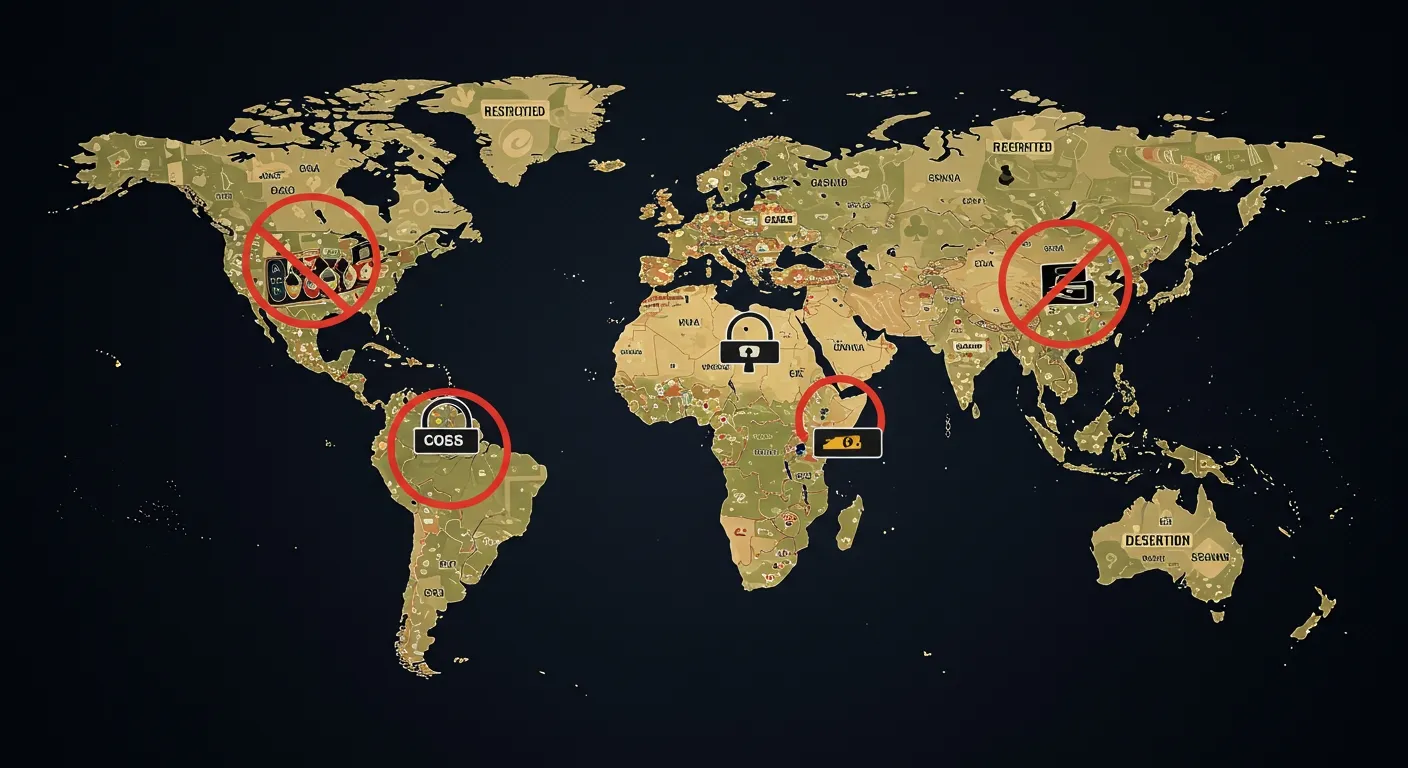Online casinos have become a global phenomenon, reshaping how millions of people experience entertainment and gambling. The convenience of playing from your phone or laptop, the wide range of games, and the chance to win real money — all these factors make online gambling incredibly appealing. But while some countries like the UK, Canada, and Malta have fully embraced this digital evolution, others have chosen to ban it outright.
So, why do some nations still take such a strict approach? The answer lies in a complex mix of legal, moral, cultural, and economic reasons — all influenced by how governments view risk, regulation, and public welfare.
The Historical and Legal Backdrop of Gambling Laws
To understand why online casinos are banned in some regions, we first need to look at how gambling has historically been regulated. Long before the internet, most countries had strict controls on betting. Gambling was often associated with moral decline, addiction, and financial ruin.
When online casinos emerged in the late 1990s, they disrupted this control. Suddenly, anyone with internet access could gamble without setting foot in a licensed venue. This caused panic among regulators. Without physical oversight, governments feared they would lose the ability to protect players and collect taxes on gambling profits. As a result, some nations took the easiest route — a complete ban — to avoid dealing with the legal and social complexities of digital gambling.
In places where gambling was already restricted or frowned upon, such as much of the Middle East, online betting simply extended existing prohibitions into the digital realm. Others, like the United States before 2018, restricted it through unclear or outdated laws until new regulations were established.
Morality, Culture, and Religion as Driving Factors
Cultural and religious beliefs play a massive role in shaping a country’s stance on online casinos. In many Islamic nations, gambling (or maisir) is explicitly prohibited under Sharia law, as it’s seen as promoting greed, chance, and irresponsibility. Therefore, these governments often block both land-based and online casino operations entirely.
Similarly, in nations with strong religious or conservative roots — like parts of Asia or Africa — gambling is still viewed as morally wrong or socially harmful. In these regions, bans are justified as a way to protect families and uphold cultural integrity. The internet might make enforcement difficult, but the intention behind these bans remains rooted in societal values.
Even in secular countries, moral arguments still influence policy. Governments often frame restrictions around the idea of “public good,” arguing that gambling addiction can lead to broken homes, debt, and crime. Whether or not that justification always aligns with modern evidence is another debate — but it’s a central reason for prohibition in many places.
Economic Control and Taxation Issues
One of the less-discussed but very real reasons for online casino bans is economic control. Many governments want to regulate gambling so they can tax it effectively and ensure that profits don’t flow abroad.
When players use offshore online casinos, money often leaves the local economy, bypassing domestic tax systems. Countries without the infrastructure to manage online gambling — such as payment regulation, anti-money laundering frameworks, and responsible gaming mechanisms — often decide that banning it outright is easier than building those systems from scratch.
In contrast, regulated markets like the UK have developed comprehensive oversight systems. Licensed casinos contribute taxes, follow player protection rules, and are held accountable by authorities like the UK Gambling Commission. However, this kind of structure requires political will, digital expertise, and strong governance — not all governments are equipped or willing to invest in that.
The Rise of Alternative Options Like UK Casinos Not on GamStop
Interestingly, the internet has made gambling bans far less effective than governments might hope. Even in countries with restrictions, players often find ways around local laws by accessing international websites or using VPNs. This has given rise to offshore platforms, including UK casinos not on gamstop — sites that operate outside the UK’s self-exclusion network.
These casinos are often licensed in jurisdictions like Curaçao or Malta, meaning they are legal from an international standpoint but not necessarily under UK regulation. They cater to players who want more freedom, faster payouts, or higher betting limits than GamStop casinos allow. However, they also come with higher risks, such as weaker consumer protection and less transparency.
The very existence of these offshore options highlights a paradox: banning online casinos doesn’t eliminate demand — it merely drives players to less-regulated environments. This can ultimately undermine the very consumer safety that bans aim to protect.
The Problem of Player Protection and Addiction
Governments often justify their gambling bans on the grounds of addiction prevention. There’s truth to that — gambling can indeed become addictive, especially in unregulated online environments that use behavioral design to keep players hooked. Slot machines, for instance, use near-miss patterns and reward loops that can stimulate the brain’s dopamine system much like drugs or social media.
Without proper regulation, there’s little to stop vulnerable players from losing control. In regulated markets like the UK, tools like GamStop, deposit limits, and affordability checks exist to minimize harm. But in countries where gambling is illegal, those tools don’t exist because the industry itself is underground. The result? Players still find ways to gamble — but with no safety net.
This is a classic example of how prohibition can sometimes do more harm than good. Instead of protecting citizens, total bans often push gambling into the shadows, where scams, fraud, and addiction thrive unchecked.
The Political Side of Gambling Restrictions
Beyond moral or social reasoning, politics also play a major role. In some nations, gambling bans are part of populist or protectionist agendas — easy political wins that signal “moral strength” or “national values.” Leaders can claim to be protecting citizens from foreign influences or moral decay, even if many citizens still gamble discreetly online.
In other cases, local casinos and state lotteries lobby against international online competition. These domestic entities often have strong political ties and pressure governments to maintain bans to protect their revenue streams. Thus, prohibition sometimes has more to do with preserving monopolies than with moral or social concern.
For developing economies, there’s also the question of priorities. Building a regulated online gambling framework takes time, expertise, and financial investment. Many governments prefer to focus on sectors like agriculture, manufacturing, or tourism — industries seen as more productive or stable than gambling. Until their financial systems mature, a ban feels like the simplest choice.
Are Total Bans Effective in the Modern World?
The reality is that total bans rarely achieve their intended goal. In the age of VPNs, digital wallets, and cryptocurrency, blocking online gambling is technically and practically difficult. Even countries with the strictest internet controls, such as China, struggle to stop citizens from accessing offshore casinos.
Instead of eradicating gambling, bans tend to create unregulated shadow markets. Players turn to foreign websites, use crypto for anonymity, and gamble without oversight. Governments lose both tax revenue and control, while consumers face greater risks. This is why more countries are shifting toward regulated licensing systems — not because they support gambling, but because it’s the only way to manage it safely in the digital era.
Regulation, when done right, benefits everyone. Players get safer environments, governments collect taxes, and legitimate operators build long-term trust. Complete bans, on the other hand, usually fail to keep up with modern technology and global demand.
The Future of Online Gambling Regulation
The global trend suggests that more countries will move toward controlled legalization rather than prohibition. Even nations that once opposed gambling are beginning to recognize its economic potential when properly regulated. Tax revenues from online gambling fund public services, while strong frameworks minimize addiction risks.
Technology will also play a vital role. AI-driven monitoring, blockchain transparency, and advanced verification systems can help balance freedom with protection. Governments that embrace this innovation will likely see better outcomes than those relying on old-fashioned bans.
Still, for countries rooted in religious or cultural prohibitions, full legalization may remain off the table. In such places, local values and belief systems will continue to outweigh economic opportunity. The global gambling landscape, therefore, will remain uneven — a patchwork of freedom, control, and outright prohibition.
Final Thoughts: Freedom vs. Protection
So, why do some countries ban online casinos completely? It’s not a simple case of right or wrong — it’s a matter of priorities. Some governments value social stability and moral order over economic gain. Others fear the challenges of regulating a fast-moving digital industry.
But as global internet access expands and digital payments become borderless, complete prohibition looks increasingly outdated. Players will always find ways to access online casinos, whether regulated or not. The smarter path forward isn’t censorship — it’s regulation, education, and responsible design.
Because in the end, the question isn’t whether people should gamble online, but whether they can do it safely, transparently, and fairly in the countries they call home.










